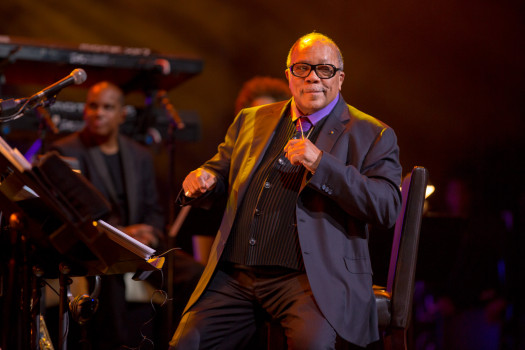
(Photo Credit: American Cancer Society)
From the African village and church to juke joints and neighborhood parks, people of color have been privileged historically with producing music as a way of communicating concerns and healing life-threatening wounds.
Quincy Jones, whose career spans six decades, believes music allows society to “love, laugh, live, give.” The legendary record producer, composer, arranger and trumpeter with 27 Grammy awards curated the American Cancer Society’s (ACS) centennial celebration concert at Atlanta’s The Fox Theatre.
Jones’ journey through film and television themes, jazz numbers, pop, funk and R&B featured singers James Ingram, Patti Austin, Siedah Garrett, Nikki Yanofsky, Allen Stone, Cuban pianist Alfredo Rodriguez and twentysomething acapella quintet Pentatonix.
The Rock & Roll Hall of Famer, 80, conducts musicians with clenched fists and direct eye contact angled acutely towards his music stand. Known simply as “Q,” the maestro with countless accolades has produced myriads of legendary recording artists including Michael Jackson, Frank Sinatra, Ray Charles and Lesley Gore.
“Q” starts the evening speaking in flashbacks about some of his famous friends and slightly joking about having brain surgery and an appendectomy. “I’m almost robotic, but life is amazing. I feel like I’m just starting over again,” says Jones. Self-described as “pretty fair for a square,” “Q” is an innovator for service, technology and education.
The “We Are The World” producer and Kennedy Center honoree serves on various boards, hosts workshops and supports numerous causes. Frequently traveling globally, “Q” challenged President Obama to develop a Secretary of Culture post similar to other nations.
“There are two things in our industry: song and story. You got to go to know. That’s what it’s about. God gave us 12 notes that everybody has had to use for the last 500 years. Nothing scares me musically,” says Jones. In addition to his signature headphones, “Q” co-founded a software application, Playground Sessions, which teaches pop music piano lessons via video tutorials.
“Music can pull people together. It’s a strange animal. You can’t taste it, smell it, see it or touch it. It can change your life,” says Jones. ACS believes its mission runs parallel to Jones’ legacy. “Here’s a legendary person with a legendary organization. We feel so fortunate to have [Quincy] here. It’s a great way to symbolize the first 100 years. Music is a common language around the world. However we can get our message out there is going to help us finish the fight a lot quicker,” says volunteer board chair Gary Reedy.
Austin agrees. “It’s a very powerful gift we’ve been given from on high. Music is a healing tool and can help people get through pain and illness,” says Austin.
“Q’s” mentorship and longevity resonates with artists both young and old. “He told me ‘Stay in the game, and keep playing the piano,’” says Ingram. Adds Pentatonix, “He always says, ‘Completely nurture people because they’re gonna rise up and be the next generation of musical talent. Be passionate and find projects that speak to who you are,’” says the group.
When Yanofsky – delivering powerhouse performances on-stage – was 15, she performed for Jones in his living room. The concert is bittersweet yet rewarding for the 19-year-old Canadian vocalist, who lost her grandmother to cancer.
“He told me ‘Check your ego at the door, enjoy and live in the moment.’ I want to help carry on a legacy and bring joy to the stage,” says Yanofsky.
Christopher A. Daniel is a pop cultural critic and music editor for The Burton Wire. He is also a contributing writer for Urban Lux Magazine and Blues & Soul Magazine. Follow Christopher @Journalistorian on Twitter.
Like The Burton Wire on Facebook. Follow us on Twitter @TheBurtonWire.








